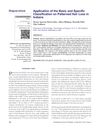 8 citations,
January 2013 in “International Journal of Trichology”
8 citations,
January 2013 in “International Journal of Trichology” The BASP classification is effective for diagnosing pattern hair loss in Indian men and women.
 40 citations,
December 2006 in “Journal of The European Academy of Dermatology and Venereology”
40 citations,
December 2006 in “Journal of The European Academy of Dermatology and Venereology” Minoxidil helps hair regrowth in traction alopecia.
3 citations,
January 2021 in “Medicinski arhiv” Trichoscopy, a hair loss evaluation technique, found that people with Androgenetic Alopecia have more thin hairs, yellow dots, and perifollicular discoloration than healthy individuals.
 1 citations,
April 2022 in “JAAD case reports”
1 citations,
April 2022 in “JAAD case reports” Oral minoxidil helped significantly regrow hair in a patient with traction alopecia.
 9 citations,
October 1988 in “Clinics in Dermatology”
9 citations,
October 1988 in “Clinics in Dermatology” Hair loss is caused by genetics and hormones, diagnosed through examination and biopsy, and treated with medications or surgery.
 January 2023 in “International journal of clinical medicine”
January 2023 in “International journal of clinical medicine” Women with PCOS and hair loss have lower levels of the protein gelsolin in their blood.
 3 citations,
December 2020 in “Journal of the turkish academy of dermatology”
3 citations,
December 2020 in “Journal of the turkish academy of dermatology” Stromal Vascular Fraction treatment increases hair density and thickness, making it a safe and effective treatment for Androgenetic Alopecia.
 8 citations,
November 2019 in “Dermatologic Clinics”
8 citations,
November 2019 in “Dermatologic Clinics” AGA treatments like minoxidil and LLLLT are safe and effective for gender minority patients.

Certain drugs can worsen hair loss in people prone to androgenetic alopecia.
 72 citations,
January 2004 in “Dermatology”
72 citations,
January 2004 in “Dermatology” Finasteride can slow hair loss and promote growth in postmenopausal women.
 December 2023 in “International Journal of Molecular Sciences”
December 2023 in “International Journal of Molecular Sciences” Men with early balding showed higher levels of certain genes linked to hair loss and possibly prostate cancer.
1 citations,
January 2019 in “Journal of Biomedical Science and Engineering” CGF from platelets helps hair regrowth in people with androgenetic alopecia.
Dr. SKS Hair Booster Serum is safe and effective for reducing hair fall and promoting hair growth.
 August 2013 in “Pharmacy Today”
August 2013 in “Pharmacy Today” Viviscal may modestly improve hair loss in women without adverse effects.
 1 citations,
January 2008 in “Actas Dermo-Sifiliográficas”
1 citations,
January 2008 in “Actas Dermo-Sifiliográficas” Treat hair loss in postmenopausal women with diet, avoiding certain drugs, and using medications like minoxidil or finasteride.
 10 citations,
September 2021 in “JAMA Dermatology”
10 citations,
September 2021 in “JAMA Dermatology” Different types of persistent hair loss after chemotherapy respond differently to treatments.
 April 2012 in “Informa Healthcare eBooks”
April 2012 in “Informa Healthcare eBooks” AGA is a common hair loss affecting both genders, treated with various therapies to promote regrowth and slow thinning.
 2 citations,
January 2019 in “International Journal of Case Reports and Images”
2 citations,
January 2019 in “International Journal of Case Reports and Images” The hair growth solution reduced hair loss and increased hair thickness in a small group of patients.
 1 citations,
July 2017 in “Clinical research in dermatology”
1 citations,
July 2017 in “Clinical research in dermatology” Hair loss, known as Androgenetic Alopecia, is often caused by hormones and can be diagnosed using noninvasive techniques. Treatments include topical minoxidil and oral finasteride, with new treatments being explored. There may also be a link between this type of hair loss and heart disease risk.
 72 citations,
March 2005 in “British Journal of Dermatology”
72 citations,
March 2005 in “British Journal of Dermatology” AGA can occur in children with family history; early diagnosis and treatment important.
 20 citations,
December 2013 in “Clinical and Experimental Dermatology”
20 citations,
December 2013 in “Clinical and Experimental Dermatology” Smoking and drinking worsened hair loss in men with genetic hair loss, while eating and sleeping habits didn't; genetics played a bigger role than environment in hair loss.
January 2020 in “Medpluse International Journal of Anatomy”  229 citations,
August 2002 in “Experimental Gerontology”
229 citations,
August 2002 in “Experimental Gerontology” AGA causes hair loss by shrinking hair follicles due to DHT binding, and can be treated with finasteride and minoxidil.
 April 2024 in “International journal of clinical trials”
April 2024 in “International journal of clinical trials” SesZen-Bio™ improves hair density, thickness, and overall hair health.
 40 citations,
July 2008 in “Drug Discovery Today”
40 citations,
July 2008 in “Drug Discovery Today” Current treatments for male pattern baldness include minoxidil and finasteride, with new options being developed.
 July 2024 in “Forum Dermatologicum”
July 2024 in “Forum Dermatologicum” Topical treatments for hair loss can be effective but need careful safety evaluation.
 29 citations,
May 2010 in “Annals of Pharmacotherapy”
29 citations,
May 2010 in “Annals of Pharmacotherapy” Finasteride may help some women with hair loss, but better options exist.

Hair loss significantly lowers life quality, especially in young men, with most patients unhappy with treatment effectiveness.

The serum effectively promotes hair growth and reduces gray hair without side effects.
 31 citations,
November 2000 in “Clinical and Experimental Dermatology”
31 citations,
November 2000 in “Clinical and Experimental Dermatology” WAA-QOL measures impact of hair loss on women's well-being.


























